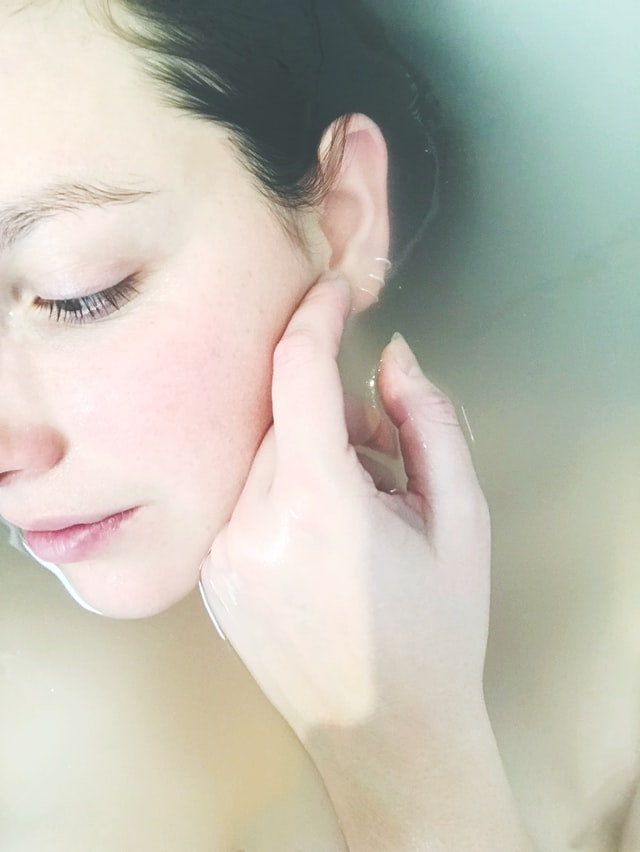
Body + Mind is reader-supported. We may earn an affiliate commission when you buy through some of the links on our site.
Everyone else is sweating, but you pull on a sweater. Your bathroom sink looks like a hayfield after you brush your dark blonde hair. What’s causing these distressing symptoms?
You could have a thyroid problem. This organ helps you regulate multiple body functions, including your metabolism. When this butterfly-shaped gland in your throat goes haywire, it wreaks havoc nearly everywhere else. Here are 10 symptoms of thyroid problems in women that may signal it’s time to call the doctor.
It’s the middle of August in Phoenix, and you pull on a pair of Sherpa socks and a sweater. Always feeling cold is a sign of thyroid troubles.
If your body makes excess thyroid hormone, you could experience the opposite problem. If you start removing layers when everyone else is bundling up, you might have a hyperactive thyroid. Since this organ regulates your body temperature, too little leaves you shivering, and too much makes you sweat.
Gaining weight without changing your diet or exercise program happens when your thyroid produces too little hormone. If you can’t seem to shed the excess pounds despite a strict diet and exercise regimen, this organ could be a possible culprit.
Conversely, excess thyroid hormone can make you lose weight. Don’t think that you can shed unwanted pounds quickly through supplementation, however. Factitious hypothyroidism occurs when someone takes too much of this hormone on purpose, and it can cause heart issues in extreme cases.
If a single snag on your sweater leads to a broken nail, you might have a thyroid problem. Both too much or too little of this hormone can cause brittle, fragile nails. Yellow nails usually indicate fungus, but they can also plague people with glandular trouble.
Your thyroid resides in your throat. Therefore, when this gland becomes inflamed, you may experience swelling, or goiter, in the front of your neck. You may also become sensitive to pressure, and wearing turtlenecks can feel constrictive.
If you have hypothyroidism or low thyroid function, it may cause you to start losing your hair. Most folks shed between 50 and 100 hairs per day naturally. However, if yours starts coming out in clumps, call your doctor without delay. Don’t assume it’s only due to stress. Hyperthyroidism, or an overactive gland, can also cause shedding.
A malfunctioning thyroid proves distressing to many women because of the toll it takes on their appearance. An underactive thyroid can cause dryness and ashy skin. It can also make you look prematurely wrinkly.
Your body’s hormones work in tandem. When one of them falls out of whack, it impacts the function of others.
In hypothyroidism, your pituitary gland signals the release of more thyroid releasing hormone (TRH). High levels of TRH interfere with the production of estrogen. As a result, your ovaries don’t release eggs. You could struggle with infertility, and your periods may stop.
Your thyroid affects metabolism, which regulates more than your temperature and how quickly you burn off a burger. It also impacts energy levels. Insufficient thyroid hormones can leave you feeling tired and sluggish.
An overage, conversely, can make it troublesome to fall asleep. Don’t assume your night sweats are due to menopause if you’re a woman over 40 — your doctor can detect thyroid problems with a blood test.
When your metabolism slows down, so do all your muscle groups, including the smooth ones. Your digestive tract may not push food through as quickly, making it challenging to go. Plus, the compact stools often contain little water, causing you to strain.
An overabundance of thyroid hormone has the opposite effect. You may develop diarrhea, and you could grow dehydrated if you don’t replenish your fluids.
The lack of energy caused by insufficient thyroid hormone can make you want to lie in bed all day. If you find it more challenging to get up when the alarm sounds, many factors could contribute.
Other causes of feeling tired after a full night’s rest include sleep apnea and restless leg syndrome. However, thyroid problems in women often contribute to excessive sleepiness. If you don’t currently have insurance and are concerned about health care costs, you can try at-home tests. These tools enable you to rule out one possible cause.
Do you recognize any of these 10 symptoms of thyroid problems in yourself? If so, talk to your doctor and get tested. Current treatments mean the cure for your symptoms may be a phone call away.
Your email address will only be used to send you our newsletter, and at any time you may unsubscribe. For more information, see our Privacy Policy.